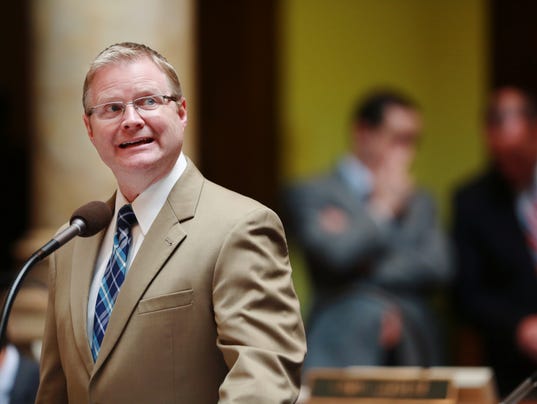by Phillip M. Bailey, @phillipmbailey –

(Photo: Jonathan Palmer/Special to the CJ)
If local voters are allowed to raise additional revenue through a temporary 1 percent sales tax hike, a good chunk of it will have go toward funding pensions for the area’s government workers under proposed changes set up by Kentucky Senate Majority Leader Damon Thayer.
The local option sales tax was assigned to the Senate’s appropriations and revenue panel this week, but it faces a number of changes that could trip up the legislation if it makes it out of committee.
Among Thayer’s floor amendments are a requirement that 25 percent of all revenue generated through the sales tax increase go to the employee retirement system of the respective city or county. Another would force local leaders to make the 1 percent tax increase revenue neutral by identifying another tax that would be cut during the same period. His amendments also would forbid prevailing wage on any of the special projects funded through the sales tax.
Thayer, R-Georgetown, could not be immediately reached for comment, but in a previous interview with the CJ the GOP leader made it clear he opposed the plan, which he sees as another tax increase.
“I don’t think the people of Kentucky need to have any more money taken from them by government at any level,” he said.
Covington Mayor Sherry Carran, a local option sales tax supporter, slammed Thayer’s amendments in an interview Friday as unnecessary state interference. She added that her city is a second-class municipality that is limited in what taxes it can levy and has received decreasing revenue from the state.
“If Sen. Thayer was to talk to local governments, especially of a larger size, he would find that what he’s asking for is unfair,” she said.
If the Senate approves of Thayer’s changes, Carran said the bill will be harder for city and county government officials to accept.
“Local governments already have the burden of lobbying or marketing a project that the local option sales tax can be used on,” she said. “All the effort is on us, but now a large benefit is going to go back to the state and no burden is being put on them.”
Advocates have said that due to across-the-board budget cuts at the state level this year, it is vital that local governments have the ability raise revenue. Others such as Carran have said having local voters back an increase at the polls is more acceptable to residents and businesses than having officials impose a levy.
The Democratic-controlled House voted to put the local option sales tax plan on the November ballot by a 60-31 margin. Supporters of the measure say the Republican majority in the Senate should be more open to the idea now that Gov. Matt Bevin has said that local voters should have the power to raise additional revenue if they choose.
To change the state constitution, allowing such a vote, the measure needs the approval of three-fifths of the 38-member Senate. The governor cannot veto nor sign a constitutional amendment proposal.
Louisville Mayor Greg Fischer, who has made the local option sales tax his priority in the General Assembly, bypassed reaction to Thayer’s changes and his office declined to say if the amendments kill the legislation’s chances. He said in a statement Friday that his office continues to “have conversations with state legislators about the importance of giving Kentuckians the right to vote on investing in their communities.”
Reporter Phillip M. Bailey can be reached at (502) 582-4475 or [email protected]
